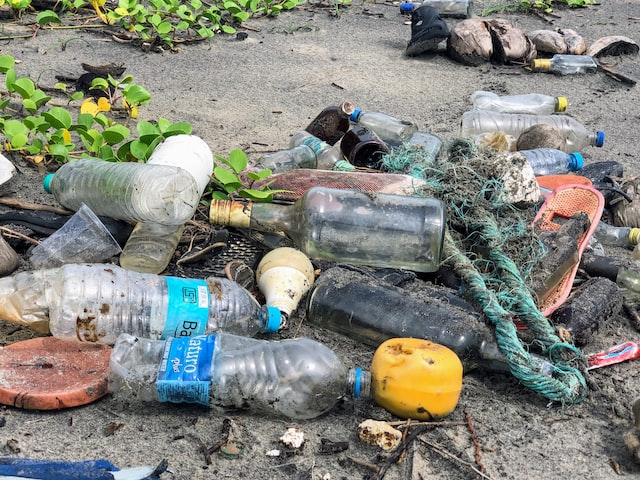Guides
Are Plastic Pallets Recyclable And Sustainable?

Many believe that plastic pallets are a waste of natural resources and cannot be recycled. This is not true! Most large grocery stores have recycling facilities for plastic containers, including beverage can trays like those found in drinkware or food storage containers.
Most recyclers will separate out plastics using favosplastic technology and equipment such as machines that detect density and composition of different materials. Therefore, it is important to know what types of plastic products are recyclable so you do not throw away money by throwing your container away.
Fortunately, there are some companies that produce reusable plastic ware such as bowls and cups. These are marketed as being more durable than their non-recycled counterparts, but they are still made from polymers which can be re-melted and reformed.
Some countries actually pay you to recycle certain types of plastic! It is up to each individual state whether this is allowed or not, but it is worth looking into if you are very conscious about our environment.
No, they are not sustainable
Many people believe that plastic pallets are recyclable or at least more environmentally friendly than using wooden crates or containers. This is simply not true! The misconception arises from comparing the thickness of plastic sheets to those plastic crates.
Thicker plastics can be recycled much less frequently than thinner ones. Materials such as thin sheeting and packaging materials can be recycled many times over before being downgraded to garbage.
This article will talk about some important points about plastic recycling. Hopefully you’ll see why it is very difficult to recycle plastic pallets in a truly effective way.
It depends
Many people have heard about plastic recycling, but they are not very clear if it is actually sustainable or not. Some say that recycling plastics is better for the environment than producing new ones, but this claim is highly controversial.
There are some theories about why investing in recycled plastic products is important. One theory says that creating more durable materials helps preserve our natural resources. Another says that using less raw material saves money.
However, there is no proof that either of these things happen consistently or to a significant degree. An investment in recycled plastic may be worth it depending on your product and how much waste you produce.
It will depend on whether you believe that saving the earth is more important than spending money, which can sometimes seem like an easy thing to do. You should only invest in recycled plastic if you’re sure you will get your money back.
Will your savings outweigh the cost of environmentally harmful production processes? This question really does come down to you. If you feel strongly about protecting the planet, then yes! It is worthwhile to spend extra on recycled goods.
But what if you don’t care as much about the environment? Then it’s probably not worth the expense. There are many ways to reduce your environmental impact without necessarily limiting your budget. view more
They aren’t recyclable everywhere
One of the major issues with plastic pallets is that they are not always easily recycled or even possible to recycle. Some countries don’t have facilities able to process this type of material, so it ends up in our landfills or oceans where it can harm wildlife.
Plastic recycling isn’t as easy as you might think! There are actually several types of plastic that can’t be mixed into ordinary plastics bins at your local waste disposal site. This includes thin sheets like those used for packaging foods, and some thicker materials such as carry-out boxes and drink bottles.
These special plastics can’t simply be melted down and re-used because there are regulations in place to make sure that nothing harmful gets released during processing. The leftover bits of plastic may also require special treatment before getting sent for recycling.
There are now a couple of companies that produce sustainable alternative products to plastic.
They are unsustainable
Many people believe that plastic pallets are recyclable, but they are not. Almost every part of a plastic pallet is something that can’t be recycled effectively. Some parts cannot even be recycled at all!
Plastic doesn’t easily break down when exposed to heat or chemicals, which makes it hard to process it in recycling plants. The material also tends to accumulate somewhere, often contaminating other materials during sorting.
Because of this, most plastics get sent to landfills where they remain, making it harder to achieve sustainability.
Fortunately, there are alternatives. You don’t need to give up using plastic ever again, but you should think about whether paper or cardboard boxes are enough for your needs. If you have a lot of small items that will fit in a box, then sure, use one instead. But if you want to save money by buying larger quantities, then consider another option. learn more
It all depends
Many people have debated whether or not plastic pallets are harmful to the environment due to their length-life and number of uses. Some claim that they can be recycled, but few know what that actually means.
There is no standardized definition for recycling plastic materials. Different facilities use different processes and equipment to recycle plastics so it is difficult to tell if something has been re-cycled or not.
Some say that thin sheets of plastic like those used in packaging material can be melted down and remixed into new products, which makes it sustainable. But this doesn’t take into account how much energy it takes to produce the plastic in the first place!
By looking at the production process of the plastic, you will find that it isn’t truly “sustainable”. This includes using fossil fuels (natural gas, oil) to create the raw materials used to make the plastic, as well as using electricity to turn the heat needed to melt them down.
Many believe that just because there is an argument either way does not mean we should stop using plastic. The truth is that we need to think about our actions and where our resources come from before making any assumptions.
Yes, they are recyclable
It is true that plastic pallets can be recycled, but only under certain conditions. Most importantly, you have to know what kind of plastic your pallet is made out of!
Most grocery stores will tell you whether or not a plastic pallet is recyclable by looking at the material code printed in small, easy-to-read font. This code typically includes three numbers and a letter. The first two numbers describe the manufacturing process used to create the pallet while the third number describes the type of polymer it is composed of.
The last letter determines how the plastics recycling company categorizes the pallet’s material. You want to make sure to check all three pieces of this information because each one impacts the ability to recycle the pallet properly.
A lot of people assume that any plastic bottle can be melted down and reworked into new products, but this isn’t always the case. For example, most beverage bottles use polyethylene terephthalate (PET) as their main ingredient.
This doesn’t work for electronics or food packaging due to its chemical composition. In these cases, the plastic pellets from the PET junk can’t be sold for reuse and must instead be trashed like normal trash.
No, they are not sustainable
Many people believe that plastic pallets are environmentally friendly as they claim to be recyclable. However, this is false! While some types of plastic can be recycled, it is extremely difficult to recycle all plastic pallets. Even if you do manage to recycle them, there is no guarantee that the process will keep them out of landfills or oceans.
Recycling does not work for every type of plastic, which means that most of your waste goes into our environment where it has an adverse effect. This includes clogging up recycling plants as well as having harmful impacts on wildlife.
There is also one major problem with trying to recycle plastic pallets; more than half of all plastic produced in the world today isn’t actually recycled. It gets burned up in manufacturing processes or wasted during transportation and storage of materials and goods. All of these new plastics add to our already large amount we have sitting around.
This doesn’t sound like much until you consider how many billions of plastic pallets there must be floating around. Almost everything we buy comes packaged on a plastic pallet, so even though you may never use another one again, you’re still creating more trash. Luckily, there are better alternatives.
It depends
Although plastic pallets are sometimes categorized as recyclable or sustainable, this is not always the case. Some types of plastic can’t be recycled effectively and even if it could, recycling plants do not accept them.
The word “plastic” comes from the term “polymer.” Polymers are long chains of molecules that stick together. A polymer made of only carbon and hydrogen atoms would not melt or change shape when heated, so it is never melted down for its individual components.
Instead, it is melted down as a whole unit, producing oil. This process is called incineration. Oil is very valuable, which is why most countries have systems in place to recycle it. Unfortunately, there are no such systems for plastics, making it more difficult to re-use them.
There are several different types of plastic used to make packaging and other products. The type of plastic you use makes a big difference in how easily it can be recycled. In fact, some say that using less environmentally friendly plastic is actually more sustainable than using thicker, heavier bottles!
This article will talk about five common types of plastic and whether they are recyclable or not. Then, we will discuss reasons why some types of plastic cannot be recycled efficiently. We will also look at some alternatives to buying new materials every time you need a crate or box.
Guides
Sims 4 Acting Skill Cheat [Acting Skill Guide]

The Sims 4 offers so many skills that it is conceivable not to learn them all.
If you want the best SIM, you can try to teach them every skill available. With such a short lifespan, cheats can help your SIM become the best.
You can use these tricks to boost a Sim’s talent to the appropriate level; you can even max out the skill, transforming it into an instant pro.

Also Read: Pokemon Go Mewtwo Location : Secret Hack Finally Revealed!
How To Enable Cheats
If you’ve used cheats before, you’re probably familiar with how to enable them. If not, we’ll go through the processes quickly. First, depending on your console, press the buttons listed below.
- PC – Ctrl + Shift + C
- Mac – Command + Shift + C
- Console (Xbox and PlayStation) – All 4 Shoulder Buttons
This will open a white box where you can put “testingcheats true”. A notice should appear indicating that cheats are enabled; after this appears, you are ready to go!
How To Use Skill Cheats
The skill cheat format is the same for all skills in the game; you only need to modify the skill in question. The basic cheat arrangement can be seen below.
- stats.set_skill_level [Skill] [Level]
Let us use video game skills as an example. If you wish to raise your Sim’s gaming talents to level ten, use the following hack. This immediately raises the skill to level 10, and you will receive all associated awards.
- stats.set_skill_level Major_Video Gaming 10
Also Read: LoL ARAM Tier List: Best Champions Ranked Players
Cheats For Acting In The Sims 4

Not every talent name is simple. Furthermore, there are several categories of skills, such as major and minor. The cheats for boosting each skill to its maximum level are listed below, organized by kind.
Major Skill Cheats
These are the normal abilities you consider, such as cooking or piano. “Major_” must appear before the skill name to specify the skill category.
- Charisma– stats.set_skill_level Major_Charisma 10
- Comedy– stats.set_skill_level Major_Comedy 10
- Cooking– stats.set_skill_level Major_HomestyleCooking 10
- Fishing– stats.set_skill_level Major_Fishing 10
- Gardening– stats.set_skill_level Major_Gardening 10
- Gourmet Cooking-stats.set_skill_level Major_GourmetCooking 10
- Guitar– stats.set_skill_level Major_Guitar 10
- Handiness– stats.set_skill_level Major_Handiness 10
- Logic– stats.set_skill_level Major_Logic 10
- Mischief– stats.set_skill_level Major_Mischief 10
- Mixology– stats.set_skill_level Major_Bartending 10
- Painting– stats.set_skill_level Major_Painting 10
- Piano– stats.set_skill_level Major_Piano 10
- Photography– stats.set_skill_level Major_Photography 10
- Programming– stats.set_skill_level Major_Programming 10
- Rocket Science– stats.set_skill_level Major_Rocket Science 10
- Video Gaming– stats.set_skill_level Major_Video Gaming 10
- Violin– stats.set_skill_level Major_Violin 10
- Writing– stats.set_skill_level Major_Writing 10
- Baking– stats.set_skill_level Major_Baking 10
- Wellness– stats.set_skill_level Major_Wellness 10
- DJ Mixing– stats.set_skill_level Major_DJ Mixing 10
- Singing– stats.set_skill_level Major_Singing 10
- Pipe Organ– stats.set_skill_level Major_PipeOrgan 10
- Parenting– stats.set_skill_level Major_Parenting 10
- Veterinarian– stats.set_skill_level Major_Vet 10
- Archeology– stats.set_skill_level Major_Archaelogy 10
- Flower Arranging– stats.set_skill_level Major_FlowerArranging 10
- Acting– stats.set_skill_level Major_Acting 10
- Research and Debate– stats.set_skill_level Major_ResearchDebate 10
- Knitting– stats.set_skill_level Major_Knitting 10
- Rock Climbing– stats.set_skill_level Major_Rock Climbing 10
Also Read: Granblue Fantasy: Tier List
Minor & Misc. Skill Cheats
These skills do not belong in the major group and appear to be rather different. Furthermore, some of these skills are above or below 10 levels, so you must adjust the number used.
- Medium– tats.set_skill_level Minor_Medium 5
- Cross-Stitching– stats.set_skill_level Skill_CrossStitch 5
- Entrepreneur– stats.set_skill_level Minor_Entrepreneur 5
- Juice Fizzing– stats.set_skill_level Minor_JuiceFizzing 5
- Media Production– stats.set_skill_level Minor_Media 5
- Bowling– stats.set_skill_level Skill_Bowling 5
- Dancing– stats.set_skill_level Minor_Dancing 5
- Pet Training-stats.set_skill_level Skill_Dog 5
Can You Lower A Skill?

You can also use these tricks to decrease a skill. Fortunately, they are treated the same. For example, if a Sim is at level 8 in the Video Game skill, you can apply the following cheat to get them back to level 4.
- stats.set_skill_level Major_Video Gaming 4
Also Read: Best DPS Tier List in Final Fantasy XIV
Final Thoughts
Your sims’ success will be determined by their ability to confidently and professionally walk into an acting gig. Instead of having your sims practice their acting skills in the mirror for hours, why not just use these cheats to skip the boring and have some fun?
Guides
Pokemon Go Mewtwo Location : Secret Hack Finally Revealed!

So you’re one step closer to becoming the best trainer in the Pokemon Go league? Your next challenge is finding the mysterious Mewtwo and you’re struggling with it. Well by the end of this article that part of the problem is definitely getting solved.
Mewtwo is one of the legendary Pokemons – both in the game and the franchise. It is a psychic type pokemon which proves to be quite a challenge to many gamers in coveting it. And unlike other wild pokemon’s that you encounter on the go, finding a Mewtwo is quite the task.
But don’t worry, whether you’re just beginning your journey on Pokemon Go or you’re a seasoned traveler, in this article we will unleash all the hacks and routes by which you are definitely going to know the way to Pokemon Go’s Mewtwo’s Location.
How Many Types of Pokemon Go Mewtwo Exist?
Well, catching Mewtwo in Pokemon Go is definitely a bit of hard work and brains combined. Moreover, there is not one, but many types of Mewtwo that you could collect on Pokemon Go.
There are four versions of a Pokemon Mewtwo that you could collect. Yes, you heard that right, Pokemon Go has four variants of Mewtwo. So when you think of Pokemon Go Mewtwo Location – there are four locations, and four ways to find them.
Firstly, there is the normal Mewtwo, or the regular Mewtwo. These are found in raids and you need a similar and strong psychic type Pokemon to battle and capture one. Then there is the Shiny Mewtwo, that you also find in raids but they come rare.
There is also the Shadow Mewtwo. You need to work harder to find this rare type of Mewtwo Pokemon. To get a Shadow Mewtwo, you need to beat Team Go Rocket boss Giovanni. We will soon cover how you will be able to do this, so keep reading to find out.
And last but not the least, there is an Armored Mewtwo. Although to be fair, this Mewtwo type was exclusive to a 2019 Pokemon Go event. This Mewtwo is rarely seen in raids or other events; now on Pokemon Go. So while there is not a specific Pokemon Go Mewtwo Location for this kind, you don’t need to feel bad. The best bet to getting this Pokemon Mewtwo in your collection now is by trading with others on Pokemon Go.
Also Read: Pokémon Arceus Mobile
How to catch Pokemon Go Mewtwo?

So we have covered all bases on the different kinds of Pokemon Mewtwo you could find online on Pokemon Go. But how and where? What is the secret to Pokemon Go Mewtwo Location on the app?
Well, it might take some time and attempts in finding a Mewtwo on Pokemon Go, but the methods are fairly simple.
To find Regular Mewtwo in Pokemon Go there is one simple way. You need to find 5-star raid battles and defeat Mewtwo in those.
Firstly, you’ll need a Raid Pass to participate in a raid battle. Raid passes are found for free by spinning the Gym Photo Discs daily. And if you don’t want that, just purchase one in the game shop.
Also Read: Three Shiny Legendary Pokemon Up for Grab In UK
These high-difficulty encounters feature Mewtwo as the Raid Boss, requiring you to team up with other trainers to take it down. Keep an eye out for Raid Eggs appearing atop Gyms. A hatching Raid Egg with a silhouette featuring horns and a long tail most likely signifies a Mewtwo encounter. Make sure to have a high ranking psychic Pokemon such as Bug, Ghost or Dark to ensure a smooth win. Once you defeat Mewtwo in Raid Battles make sure you have Premier Balls to catch it. Also keep Golden Razz Berries on you, those make winning the battle a piece of cake.
Also remember that shiny mewtwo’s are a 1 in a 20 rare sight in raid battles, so keep your eyes open to finding one.
Shadow Mewtwo’s are a little tricker to find. They are usually hidden in Giovanni’s battle. Giovanni is Team Rocket Go’s boss and winning against him is the gate towards Pokemon Go Mewtwo’s Location to find a Shadow Mewtwo. Perform tasks where you need to battle grunts and catch Shadow Pokemons to get closer to battling with Boss Giovanni.
Also Read: What is Pokemon: Phoenix Rising?
What Pokemons Should You Use To Capture Mewtwo In Pokemon Go?
Mewtwo is a tough Pokemon to defeat in battles. It’s a coveted psychic Pokemon and thus to beat it, one has to use equally strong Psychic Pokemon moves. You can also use Charged Attacks to increase your chances of winning.
These are the Pokemon’s you could use in a Pokemon Go Battle for Mewtwo:
- Tyranitar: It’s a Rock or Dark Type Pokemon. Even though this is not a Psychic Pokemon, it can take enough hits from Psychic Moves. It’s charged Stone Edge Attack really packs a strong comeback against Mewtwo’s moves.
- Scizor: This is a Bug/Steel type Pokemon. This one can also withstand Psychic damage. Its special move is the X-Scissor Move that does heavy damage to Mewtwo.
- Gengar: Gengar is a very popular Pokemon. It was one of the top Pokemon used by Team Rocket in the actual Pokemon anime to fight battles. Gengar is a Poison or Ghost type Pokemon. It takes no damage from Psychic moves and instead can hurt Mewtwo with the Shadow Ball Attack.
- Mewtwo: Yes, who said you can’t defeat your own kind? Mewtwo is itself a great fighter against another Mewtwo. Being a Psychic Pokemon, it absorbs the attacks well. Its own Psychic Attacks prove fatal against the competing Mewtwo.
Having the right kind of Poekmon with the smartest moves and attacks, will make sure that you capture a Mewtwo in Pokemon Go easily.
Pokemon Go Mewtwo Location: Secret iOS Hack!
Are you an iPhone or iOS device user playing Pokemon Go? Then smile, because you have the easiest hack to finding not only Mewtwo in Pokemon Go, but all other exclusive Pokemons too!
The iWhere iPhone Location Changer is the show changing app for Pokemon Go players with an iPhone or other apple device. This record breaking tool allows you to fake your GPS locations. What does it mean for you? This means that you can now enjoy playing the Pokemon Go game to the fullest without the hassle of changing locations by actual travel.
iWhere is compatible with all devices and has a lot of gaming modes to make your Pokemon Go experience better and smoother. The app was made for AR games like Pokemon Go.
Also Read: Is a Pokemon Wii U game in the works?
Conclusion
So now you know the different ways in which you can find Mewtwo on Pokemon Go. Even better, you now know that there is not only one kind of Mewtwo collect, but 3 more to discover. Finding a strong Pokemon like Mewtwo on Pokemon Go makes the gaming much better and easier. With a strong Psychic Pokemon like Mewtwo keep being victorious on all your adventures in Pokemon Go!
Guides
Mastering the CSGO Walls Command: How to Activate

The CSGO walls command, often referred to as a wallhack, allows players to see through walls, giving them an immense tactical advantage. Though it’s important to use this feature responsibly, players can improve their strategy and game sense by understanding how it works.
Setting Up Your Game for Commands
Before you can use the walls command, you need to enable the developer console in CSGO. Here’s how to do it:
- Open CSGO and Go to Settings: Navigate to the game settings and find the ‘Enable Developer Console (~)’ option.
- Enable the Console: Toggle this option to ‘Yes.’
- Open the Console: Press the ~ key (tilde) to open the console while in-game.
Once the console is enabled, you can start entering various commands to change your gameplay experience.
Also Read: Enjoy4Fun: Your Ultimate Destination for Online Gaming
Activating the Walls Command in CSGO
To activate the walls command, follow these steps:
- Open the Developer Console: Press ~ to bring up the console.
- Enter the Command: Type sv_cheats 1 and press Enter. This enables cheat commands in the game.
- Activate the Walls Command: Type r_drawothermodels 2 and press Enter. This command will enable the wallhack, allowing you to see players through walls.
Understanding the Mechanics of the Walls Command
The r_drawothermodels 2 command alters the game’s rendering of player models, making them visible through walls. It essentially changes the way the game’s graphics engine processes certain elements, providing you with a clear view of all players regardless of obstacles.
Also Read: How to Change Language LoL: Quick Guide for 2024
Practical Applications of the Walls Command
Using the walls command can help in various ways:
- Map Knowledge: It allows you to learn enemy positions and movements, improving your map awareness.
- Strategic Planning: By knowing enemy locations, you can plan your movements and strategies more effectively.
- Training: Use it in private matches to practice spotting enemies and understanding common hiding spots.
Advanced Tips for Using the Walls Command
To maximize the benefits of the walls command, consider combining it with other useful commands:
- Wireframe Mode: Use mat_wireframe 1 to see a wireframe view of the map and players.
- No Clip Mode: Enable noclip to move freely through the map and study enemy positions.
Customizing these commands can provide a more comprehensive understanding of enemy tactics and improve your gameplay.
Also Read: Top 10 Fortnite Dropper Codes for Epic Challenges
Ethical Considerations and Fair Play
While the walls command is a powerful tool, it’s crucial to use it ethically. Using wallhacks in competitive matches is against the rules and can result in severe penalties, including bans. Always use such commands in private or offline matches to avoid disrupting fair play and maintaining the integrity of the game.
Conclusion
Gaining skill with the CSGO walls command can greatly increase your knowledge of the game and your abilities. By turning on the developer console and applying commands sensibly, you can learn a great deal about the strategies and behaviors of your opponents. Remember to use these tools ethically to ensure a fair and enjoyable gaming experience for everyone. Happy gaming!
-

 Guides4 years ago
Guides4 years ago6 Proven Ways to Get more Instagram Likes on your Business Account
-

 Mainstream9 years ago
Mainstream9 years agoBioWare: Mass Effect 4 to Benefit From Dropping Last-Gen, Will Not Share Template With Dragon Age: Inquisition
-

 Casual8 months ago
Casual8 months ago8 Ways to Fix Over-Extrusion and Under-Extrusion in 3D Printing
-

 Guides5 months ago
Guides5 months agoExplore 15 Most Popular Poki Games
-

 Guides1 year ago
Guides1 year agoGan Rubik’s Cube vs. Traditional Rubik’s Cube: Key Differences and Advantages
-

 Uncategorized3 years ago
Uncategorized3 years agoTips To Compose a Technical Essay
-

 iOS Games1 year ago
iOS Games1 year agoThe Benefits of Mobile Apps for Gaming: How They Enhance the Gaming Experience
-

 Mainstream11 years ago
Mainstream11 years agoGuild Wars 2: The eSports Dream and the sPvP Tragedy






